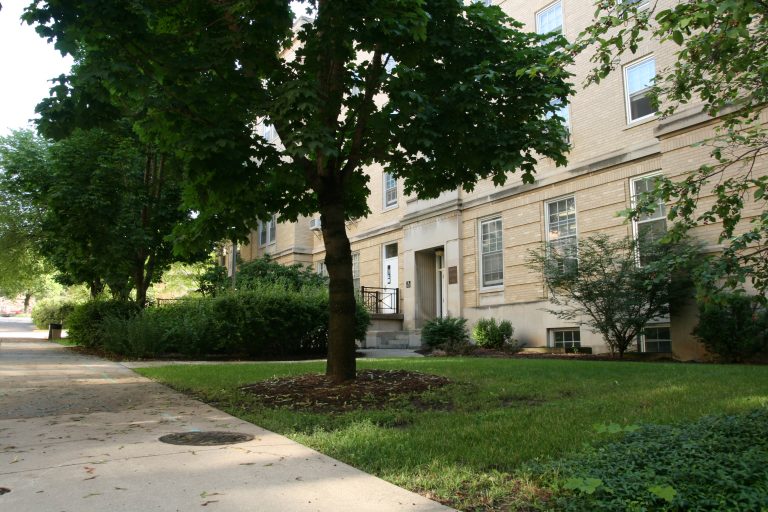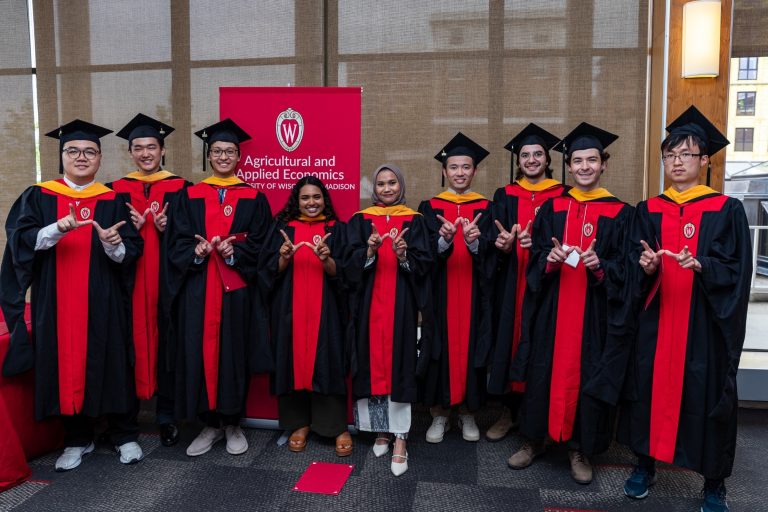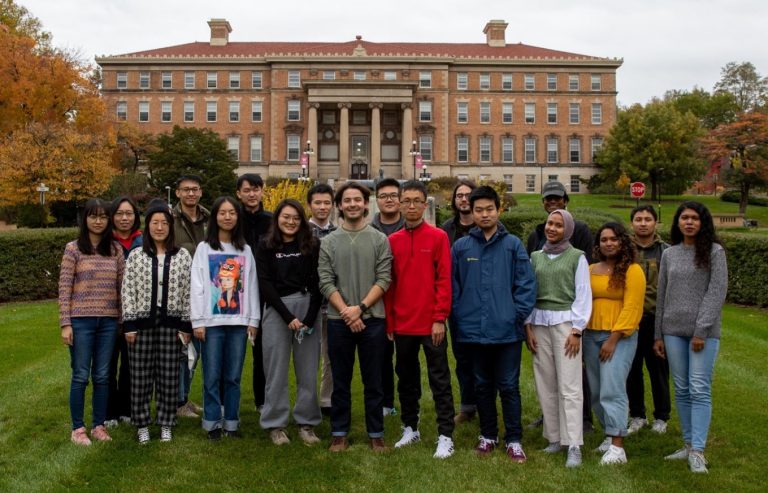Program Overview
Technological and behavioral changes have caused enormous amounts of data to be made available in nearly all sectors of the economy; generating useful insights from this information requires skills in economic reasoning, data management, empirical analysis, and technical communication.
The M.S. Agricultural and Applied Economics Professional Option (MSPO) program is a full-time accelerated professional master’s program designed to meet the growing private sector demand for quantitatively-skilled analysts and managers. Students will be well prepared to enter the professional workforce in both the US and abroad in data-intensive and quantitatively focused jobs in economic consulting, businesses, agribusinesses, non-profit organizations focused on development, and governmental sectors. The MSPO is a STEM-designated program which allows graduates to apply for the Optional Practical Training (OPT) STEM extension to work in the U.S. an additional 24 months following graduation (3 years total).
(For those without access to YouTube, please use this link to watch the video).
The program typically takes 2 years (5 semesters) to complete but can be completed in as little as 12 months (3 semesters). Students that have full-time jobs or other responsibilities are also able to complete the degree on a flexible part-time basis, taking 1-2 classes per semester for up to five years.
Students that graduate with a bachelor’s degree from UW-Madison can transfer up to seven credits of approved electives towards the MSPO degree (e.g., 300+ level classes from AAE, Economics, Statistics or related departments). Motivated undergraduate students pursuing the AAE or ABM major also have the option of applying for the 4+1 Accelerated MSPO Pathway which provides AAE undergrads the possibility of expediting the graduate application process and completing a bachelor’s and master’s degree in just five years. Students that wish to pursue the 4+1 Accelerated MSPO option should complete AAE 636: Applied Econometric Analysis and AAE 637: Applied Econometrics II OR AAE 719: Applied Business Economics with a grade of “B” or better by the end of their senior year. For more information about this accelerated path and approved electives, contact the MSPO Coordinator, Jordan van Rijn, at vanrijn@wisc.edu.
AAE MSPO also partners with the National Association of Business Economists, and the program allows students to become a Certified Business Economist (CBE).
Curriculum
While the MSPO program focuses on key themes of data analysis, applied economic intuition, and professional development, it allows students to choose a sequence of required and elective courses depending on students’ career goals. Generally, students interested in careers as economists, data analysts, data scientists, or economic researchers should consider Course Plan A focused on Applied Economics. Students interested in careers related to agribusiness management, agricultural economics, food industry management, business economics, commodity trading, or agribusiness consulting are well prepared for those job markets by pursuing Course Plan B that emphasizes Agribusiness Management.
Below are the recommended courses for each course plan, as well as additional elective credits that students may pursue from AAE’s major fields of specialty, including International Development, Community Economic Development, Agricultural Economics, Quantitative Methods, and Resource, Energy and Environmental Economics.
| Course Plan A | Course Plan B | ||
|---|---|---|---|
| Summer (Optional) |
AAE 601: Applied Economics (3 credits) | ||
| AAE 670: Mathematics for Agricultural and Applied Economics (3 credits) | |||
| Fall (10+ credits) |
AAE 636: Applied Econometrics I (3 credits) | ||
| AAE 720: Seminar in Quantitative and Applied Economics (1 credit) | |||
| AAE 635: Applied Microeconomic Theory (3 credits) | AAE 625: Agribusiness Economics and Management (3 credits) | ||
| Electives in AAE (3+ credits) | |||
| Spring (9+ credits) |
AAE 721: Writing and Speaking for Applied Economists (1 credit) | ||
| AAE 637: Applied Econometrics II (4 credits) | AAE 719: Applied Business Economics (4 credits) | ||
| Electives in AAE (4+ credits) | |||
| Summer (3+ credits) |
AAE 718: Data Science for Agricultural and Applied Economics (3 credits) | AAE 718: Data Science for Agricultural and Applied Economics (3 credits) | |
| AAE 899: Graduate Practical Training/Internship (2-6 credits) | |||
| Fall (8+ credits) |
AAE 723: Professional Development for Applied Economists (1 credit) | ||
| AAE 724: Practicum for Applied Economists (4 credits) | AAE 899: Graduate Practical Training/Internship (2-6 credits) | ||
| Electives in AAE (3+ credits) | |||
Elective course work:
In addition to the above required courses, MSPO students must complete additional elective credits to fulfill the 30 total required credits for the master’s degree. Optional electives include:
-
- AAE 319: The International Agricultural Economy (3 credits)
- AAE 320: Agricultural Systems Management (3 credits)
- AAE 322: Commodity Markets (4 credits)
- AAE 323: Cooperatives and Alternative Forms of Enterprise Ownership (3 credits)
- AAE 335: Introduction to Data Analysis using Spreadsheets (2 credits)
- AAE 343: Environmental Economics (3-4 credits)
- AAE 350: World Hunger (3 credits)
- AAE 352: Global Health: Economics, Natural Systems and Policy (4 credits)
- AAE 371: Energy, Resources and Economics (4 credits)
- AAE 373: Globalization, Poverty and Development (3 credits)
- AAE 375: Special Topics (1-4 credits)
- AAE 419: Agricultural Finance (3 credits)
- AAE 421: Economic Decision Analysis (4 credits)
- AAE 422: Food Systems and Supply Chains (3 credits)
- AAE 462: Latin American Economic Development (3 credits)
- AAE 473: Economic Growth and Development in Southeast Asia (3 credits)
- AAE 474: Economic Problems of Developing Areas (3 credits)
- AAE 477: Agricultural and Economic Development in Africa (3 credits)
- AAE 520: Community Economic Analysis (3 credits)
- AAE 526: Quantitative Methods in Agricultural and Applied Economics (4 credits)
- AAE 531: Natural Resource Economics (3 credits)
- AAE 540: Intellectual Property Rights, Innovation and Technology (3 credits)
- AAE 561: Energy Markets (3 credits)
- AAE 641: Foundations of Agricultural Economics (3 credits)
- AAE 642: Foundations of Development Economics (3 credits)
- AAE 643: Foundations of Environmental and Natural Resource Economics (3 credits)
- AAE 671: Energy Economics (3 credits)
- AAE 722: Machine Learning in Applied Economic Analysis (4 credits)
- AAE 737: Applied Econometric Analysis III (3 credits)
See courses for more details about AAE course offerings.
Application
All applicants must provide:
- Official transcripts from an accredited U.S. institution or a comparable international institution
- Bachelor’s degree from an accredited U.S. institution or an international degree comparable to a regionally accredited U.S. bachelor’s degree
- TOEFL, IELTS scores, if applicable
- Statement of purpose essay/reasons for graduate study
- CV/Resume
- Two letters of recommendation
- The GRE is optional for candidates who earned a bachelor’s degree or higher from an accredited U.S. institution and have an overall GPA of 3.0 or higher. We also approve GRE waivers to students with a strong undergraduate GPA and background in economics, statistics, math or related subjects. If you would like to request a GRE waiver, please fill out this form. Candidates who received below a 3.0 GPA are strongly encouraged to take the GRE to show the admissions committee they have the academic ability to handle the rigors of the MSPO program. (GRE scores must be from the previous 5 years).
More information on Graduate Admissions
Visiting International Students Program
For questions regarding the MSPO program, contact Jordan van Rijn, PhD at vanrijn@wisc.edu.
Career Outlook & Salary Expectations for Economists
According to the Bureau of Labor Statistics (BLS), employment of economists is projected to grow 6% from 2019 to 2029, twice as fast as the average for all occupations (3%). Moreover, the median economist in the U.S. earns $113,940 per year. Economists use data and statistical techniques to conduct research and analysis in a variety of fields, including education, health, development, agriculture and the environment. Typical jobs for graduates with a degree in economics include Economist, Data Scientist, Quantitative Analyst, Credit Analyst, Economic Consultant, Lecturer of Economics, Financial Analyst and Data Analyst. The biggest employers of economists are the federal government (27%); management, scientific and technical consulting services (20%); scientific, research and development services (11%); state government (10%); and finance and insurance companies (7%).
In the corporate sector, the National Association of Business Economists (NABE) reports that in 2022 the median base salary for business economists was $156,000 plus $31,500 in additional compensation. Moreover, economists with a master’s degree typically made $144,500 in base salary versus just $111,648 for economists with only a bachelor’s degree. Economists that graduated with a degree from one of fifteen “top-ranked schools” (including the University of Wisconsin-Madison) earned $181,000 in base salary at the median versus $160,000 from other universities. Finally, economists with NABE’s Certified Business Economist (CBE) designation earned $209,000 versus $156,000 for business economists without such certification.
Cost of Study
The program costs $1,500 per credit. (More information on the full cost of study at the University of Wisconsin is available here.) Scholarships are available for eligible students, funds permitting. Currently, scholarships are available for Wisconsin residents, Peace Corps returnees and working professionals in relevant fields.
Wisconsin & Minnesota In-State Scholarships:
Criteria: Wisconsin and Minnesota residents with a four-year Bachelor’s degree and a GPA of 3.4 or better from an accredited institution of higher education.
Amount of scholarship: Tuition scholarship at the rate of $500 per credit compensation for Wisconsin residents and $400 per credit for Minnesota residents (up to $15,000 during the entire degree time).
Peace Corps & AmeriCorps Scholarship:
Criteria: Former Peace Corps and AmeriCorps volunteers that have completed at least one year of service and hold a four-year Bachelor’s degree with a GPA of 3.4 or better from an accredited institution.
Amount of scholarship: Tuition scholarship at the rate of $500 per credit compensation up to $15,000 during the entire degree time.
Professional Scholarship:
Criteria: U.S. citizens or legal residents that are currently working professionals in a relevant field (e.g., economics, agribusiness, data analysis, finance, etc.). Eligible applicants must have completed a four-year Bachelor’s degree with a GPA of 3.4 or better from an accredited institution of higher education.
Amount of scholarship: Tuition scholarship at the rate of $500 per credit compensation up to $15,000 during the entire degree time. (Students may also be eligible for additional financial support from their employer, such as tuition reimbursement. Please check with your employer regarding this possibility).
Funding opportunities for students from India:
We understand that pursuing your Master’s degree in the United States can sometimes place an unfair financial burden on you and your family. We do not want concerns over funding to affect your decision to apply to the University of Wisconsin-Madison.
If you are keen to learn more about funding options for students from India, have a look at our trusted Funding partner, GradRight. It hosts the world’s first loan-bidding platform, FundRight, which offers students access to personalized, unsecured, and low-cost education loans within minutes.
You can also check your eligibility for scholarships offered by GradRight.







